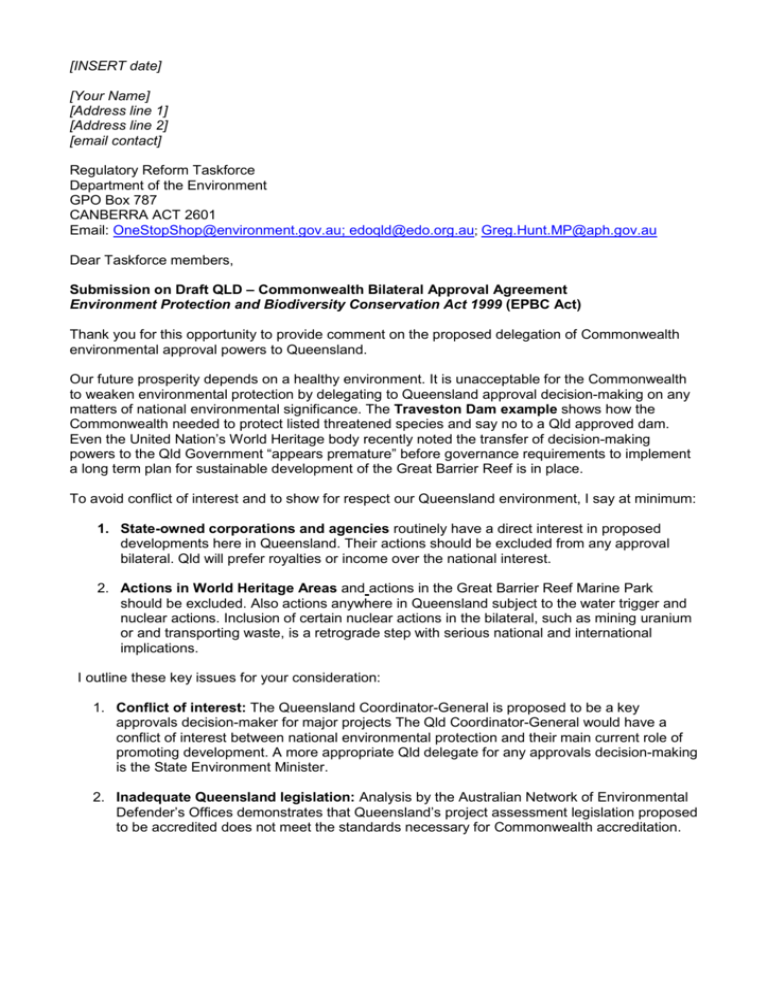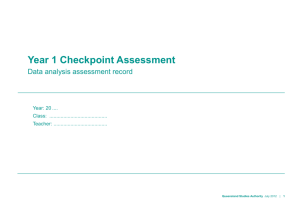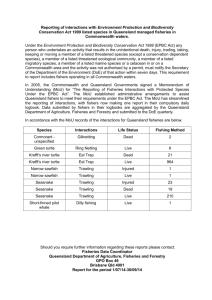2 page template submission
advertisement

[INSERT date] [Your Name] [Address line 1] [Address line 2] [email contact] Regulatory Reform Taskforce Department of the Environment GPO Box 787 CANBERRA ACT 2601 Email: OneStopShop@environment.gov.au; edoqld@edo.org.au; Greg.Hunt.MP@aph.gov.au Dear Taskforce members, Submission on Draft QLD – Commonwealth Bilateral Approval Agreement Environment Protection and Biodiversity Conservation Act 1999 (EPBC Act) Thank you for this opportunity to provide comment on the proposed delegation of Commonwealth environmental approval powers to Queensland. Our future prosperity depends on a healthy environment. It is unacceptable for the Commonwealth to weaken environmental protection by delegating to Queensland approval decision-making on any matters of national environmental significance. The Traveston Dam example shows how the Commonwealth needed to protect listed threatened species and say no to a Qld approved dam. Even the United Nation’s World Heritage body recently noted the transfer of decision-making powers to the Qld Government “appears premature” before governance requirements to implement a long term plan for sustainable development of the Great Barrier Reef is in place. To avoid conflict of interest and to show for respect our Queensland environment, I say at minimum: 1. State-owned corporations and agencies routinely have a direct interest in proposed developments here in Queensland. Their actions should be excluded from any approval bilateral. Qld will prefer royalties or income over the national interest. 2. Actions in World Heritage Areas and actions in the Great Barrier Reef Marine Park should be excluded. Also actions anywhere in Queensland subject to the water trigger and nuclear actions. Inclusion of certain nuclear actions in the bilateral, such as mining uranium or and transporting waste, is a retrograde step with serious national and international implications. I outline these key issues for your consideration: 1. Conflict of interest: The Queensland Coordinator-General is proposed to be a key approvals decision-maker for major projects The Qld Coordinator-General would have a conflict of interest between national environmental protection and their main current role of promoting development. A more appropriate Qld delegate for any approvals decision-making is the State Environment Minister. 2. Inadequate Queensland legislation: Analysis by the Australian Network of Environmental Defender’s Offices demonstrates that Queensland’s project assessment legislation proposed to be accredited does not meet the standards necessary for Commonwealth accreditation. For practical legal enforceability the various EPBC Act decision -making criteria and duties, such as to comply with international treaties such as the World Heritage Convention, need to be required to be each separately and specifically written into the Queensland legislation. Further, provisions about taking a developer’s environmental record into account in decision-making and provisions outlawing supply of false and misleading information by a developer need to be strengthened in Qld legislation to be the same as the EPBC Act. 3. Accountability and Enforcement: I strongly support proposed extended legal standing for community groups for judicial review or open standing for enforcement to be equal to the EPBC Act. Relevant Queensland legislation does not include those provisions, which means legitimate community groups may be unable to take action as a safeguard against official inaction. 4. Public Access to information: It is also important that Queensland is required to have provisions about public access to information in Qld legislation, not just policy. This is a valuable safeguard for the public. 5. Likelihood of poor enforcement: What resources will be provided to Queensland to implement bilateral approval responsibilities? The Qld State Government is not resourced to adequately administer Commonwealth laws and its poor record of enforcement has been exposed in 2014 by the Queensland Audit Office. The potential cost to the tax-payer where these laws are poorly enforced could quickly outweigh any perceived benefit of delegation of approvals. 6. Call-in Powers: The Commonwealth needs power to exercise call-in powers to decide an application not merely before a decision is made by Queensland but within a period after Qld makes a delegated decision. This flexibility is important to ensure Commonwealth oversight. Under the Commonwealth Government’s proposed policy, each state and territory will have different regulatory requirements, creating a patchwork regulatory system. Instead of the mythical one-stop shop we will have an eight-stop shop. There is a strong likelihood that, rather than deliver streamlined approval processes, the delegation of approval powers to Queensland with new legislation with new terminology, will result in approval delays. Without proper Commonwealth assessment, individual and community stakeholders will feel disengaged and there may be legal challenges. I urge the Taskforce to recommend against handing Commonwealth responsibility for ‘Matters of National Environmental Significance’ under the EPBC Act to the Queensland Government. Alternatively please ensure the above issues are addressed. The Commonwealth Government plays a critical role in delivering shared prosperity and quality of life for all Australians. Australia’s future prosperity depends on the adoption of a functional, consistent approach to environmental protections. Yours sincerely, [insert name]






